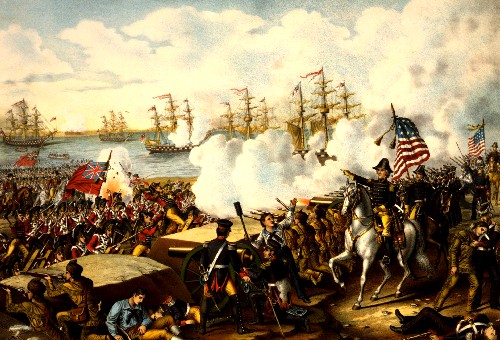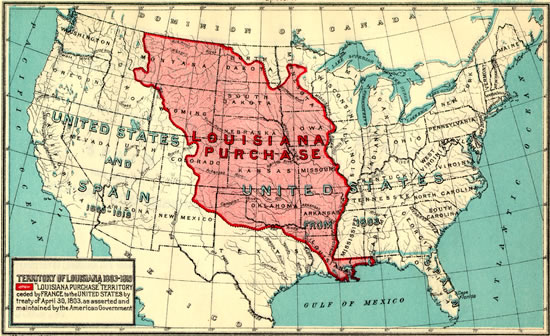"Cartoons by William Charles. Yesterday's Papers. https://blogger.googleusercontent.com/img/b/R29vZ2xl/AVvXsEgzzYWZvsWFO36Tg8VRieSSt1ElHqL4MScOhFnhSmyZ8WwGfbeQYqiQrT7indiL1BReYGs5OOR7mpNFSDqSFyYfrxvhqgx_pEH6CdS2q9uRzm1zGcEdi6O1f4VkPhj49uHYR7GyoZPD3LM/s1600/030_William_Charles_Embargo_Cartoons_1811.jpg
War of 1812: The War of 1812 began when, due to the effects of Macon’s Bill No.2, America had to declare an embargo against Britain and, to Madison’s dismay, take part in a European war. During the meeting of the Twelfth Congress in 1811, “war hawks” advocated for war against Britain to end British impressment of American sailors, to face hostile Indians armed by the British, to expand into British territory, and to defend America’s honor. War was declared on June 15, 1812. The war itself was small-scale and ended with all territories restored to the original occupants. Nevertheless, the war yielded great consequences. America was respected by other world powers, and so were American diplomats, for going to war with a giant like Britain and emerging relatively unscathed. The Federalist Party died after the Hartford Convention, leading to a politically united country. Indians relinquished yet more territory north of the Ohio River, allowing American expansionists to continue migrating. Above all was a heightened nationalism that emerged, where the country rejoiced in unison the outcome of the war.
 |
"Battle of New Orleans. Haysville Library.
|

"Invasion. BizarroComics. http://bizarro.com/wp-content/uploads/sites/172/2013/07/bz-06-25-10-invasion.jpg"
John Marshall Supreme Court Decisions: Despite serving when anti-Federalist Thomas Jefferson was in office, Chief Justice John Marshall’s court decisions each served to empower the national government or individual rights at the expense of the states. A stronger government meant a growing national spirit, and withholding states’ rights meant less chance for the states to challenge the authority of the federal government, putting a commercial focus on the central government. It also meant that people feared the state legislations less, since Marshall established property and corporation rights to reduce state influence, creating a more stable and predictable environment for businesses.
McCulloch v. Maryland (1819): This case was about Maryland’s right to tax the bank notes issued by the Bank of the United States, and if the federal government even had a right to create a federal bank. Marshall ruled in favor of the National Bank, and declared that states had no power to tax any federal policies. This established that the federal government’s word was the law of the land, overriding any state’s legislature. Thus, people in various states would identify more with the powerful federal government rather than remain loyal to only one state.
Dartmouth College v. Woodward: The state of New Hampshire in 1819 tried to change the charter of Dartmouth College, originally granted by King George III, to a state charter. The court held that the charter was a valid contract, and that states do not have the right to unilaterally interfere with contracts relating to private parties. In effect, private corporations were protected. This made it easier for businesses to flourish without being dominated by states, reducing sectionalism.
Gibbons v. Ogden (1824): Marshall’s court overturned a New York law that gave the state the right to tax and regulate steamboats that were passing through the Hudson River. The justification was that the Constitution gave only the federal government the right to regulate interstate commerce; New York had no claim to its monopoly. Keeping interstate commerce controlled by a party more powerful than the states decreased inter-state competition and disputes that would come in the way of national pride.
 |
| "John Marshall. Collegehumor. http://0.media.collegehumor.cvcdn.com/53/71/248b14d3bbfabe33909a68aa84496af0-oh-john-marshall-youre-adorable.jpg" |
Adams-Onís Treaty: In the wake of the Anglo-American convention in 1818 , where the US and Britain came to agreements on various territories, the ratification of West Florida by Congress in 1819, and the series of Latin American revolutions that happened in the early nineteenth century, Spain was beginning to feel vulnerable. Forced to leave Florida unprotected to quell their colonies in South America, General Andrew Jackson took the initiative to seize important Spanish posts while on a mission to catch Native American criminals. The nationalistic Secretary of State, John Quincy Adams, demanded huge concessions of land from Spain; Spain agreed. The acquisition of Florida and Spanish claims to Oregon in exchange for relinquishing U.S. claims to Texas bolstered nationalism by continuing the expansionist idealism that emerged after the Louisiana Purchase.
The Monroe Doctrine (1823): As Latin American Revolutions in the 1820’s released their colonial chains, European powers wanted to destroy the democratic saplings, and perhaps recolonize the continent. Americans, afraid that their republican experiment would be threatened by Europe, and the British, concerned for their Caribbean sugar islands, both were eager to keep the rest of Europe away from the Western Hemisphere. Americans felt protective of their country, and so Secretary Adams wrote a statement that said the era of colonization and intervention had ended in the Americas; in exchange, the U.S. would not interfere in European affairs. Although this warning was in backed up by the powerful British, who wanted complete access to Latin American markets, it increased America’s influence in the world and its sense of isolationism. The United States also took upon itself the role of the protector of the Americas.
|
|






No comments:
Post a Comment